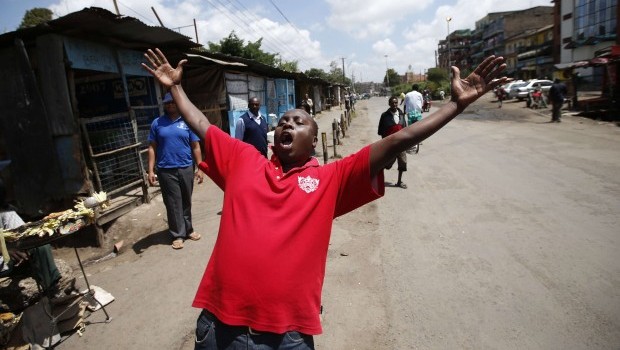
A supporter of Presidential candidate Uhuru Kenyatta celebrates in the Mathare slum in the Kenyan capital of Nairobi March 9, 2013. Source: REUTERS/Goran Tomasevic
Final preliminary numbers given by the commission showed Kenyatta with 50.03 percent of the vote. He needs more than 50 percent to win outright and avoid a runoff with Prime Minister Raila Odinga, who had 43.3 percent. The commission said the overall turnout was 86 percent.
Kenyatta, the son of Kenya’s founding president, is indicted for crimes against humanity by the International Criminal Court. If he becomes president, problems with Western allies are expected.
That did not appear to be a concern for Kenyatta supporters, and may have even won him votes from Kenyans angry at what they see as outside meddling.
Despite the celebrations, there appeared to be an outside possibility that the election commission could announce revised figures that would put Kenyatta back under 50 percent.
Franklin Bett, an Odinga camp official, told journalists waiting at the election tallying center that the commission hadn’t yet announced results as of Saturday afternoon because Odinga’s team was challenging the results of one location.
“There should be no premature celebration or premature commiseration,” Bett said.
Kelvin Mwangi, a taxi conductor, was one of several Kenyatta supporters who huddled around a taxi in discussion of their candidate’s win. There were many more similar groups in the distance, and around Nairobi, and they were more likely to be Kikuyus jubilating — as well as Luos coming to terms with Odinga’s loss.
“I feel great because we have won this election,” said Mwangi, who like Kenyatta is an ethnic Kikuyu. “Uhuru sold his policies to young people while Raila was busy criticizing him.”
The election commission said it would make a formal announcement of the winner. The scheduled announcement was more than an hour late as of midday Saturday in Kenya.
Eliud Owalo, Odinga’s chief campaign manager, said the prime minister would not concede defeat “because the process was fraudulent.” He did not elaborate.
Though Kenyatta appears to have just barely squeaked by the 50 percent hurdle, he solidly beat Odinga, one of eight candidates. That fact may help prevent the violence that exploded in Kenya after its last presidential vote, in 2007, when more than 1,000 people were killed.
The final provisional figures showed Kenyatta finishing with 6,173,433 votes out of 12,338,667 cast. Odinga had 5,340,546 votes.
A win by Kenyatta could greatly affect Kenya’s relations with the West. Kenyatta faces charges at the International Criminal Court for his alleged role in directing some of Kenya’s 2007 postelection violence. His running mate, William Ruto, faces similar charges.
Francis Eshitemi, an Odinga supporter Nairobi’s largest slum, Kibera, said it was clear his candidate had lost in a free and fair election and that he expected him to concede.
“The problem is that Raila doesn’t have the numbers. There were a few irregularities, but the gap between Raila and Uhuru is big,” he said.
Isaac Khayiya, another Odinga supporter, said: “This time we want post-election peace, not war. We will be the ones to suffer if there is violence. For them—Uhuru, Ruto, Odinga—they have security and they are rich.”
The United States has warned of “consequences” if Kenyatta wins, as have several European countries. Britain, which ruled Kenya until the early 1960s, has said they would have only essential contact with the Kenyan government if Kenyatta is president.
Odinga’s camp has indicated legal challenges could be filed. Monday’s presidential vote proceeded mostly peacefully, but the counting process has been stymied by a myriad of break-downs and errors.
That the winner was quietly revealed overnight—at about 2:35 a.m. local time—came as somewhat of a surprise. At about midnight the electoral commission said it would give a formal announcement of the winner at 11 a.m. Kenya time (3 a.m. EST) Saturday. Observers believed that the decision was made in part not reveal a winner overnight, something that could stir suspicions and put security forces at a disadvantage if rioting broke out.
In order to win outright, Kenyatta must not only get more than 50 percent of the vote but also must garner at least 25 percent of the vote in 24 out of Kenya’s 47 provinces. Because of the way the election commission announced results, it was difficult to immediately determine if Kenyatta passed that bar.
Diplomats said they believed Odinga was not likely to protest the vote in a manner that would increase the chances of violence, but rather honor his pledge to respect the result and petition the courts with any grievances. Odinga scheduled a news conference for later Saturday morning.
